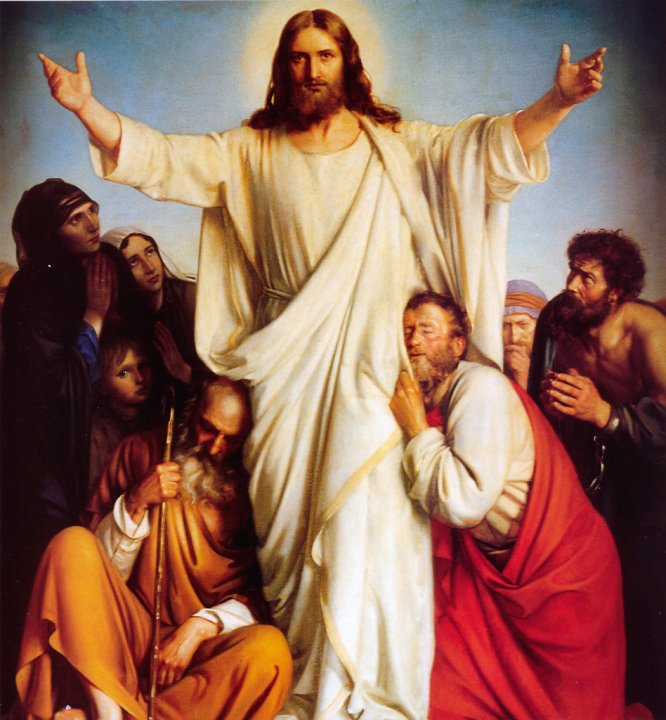PASSION SUNDAY (Palm Sunday)
Commemoration of the Lord’s Entrance into Jerusalem
I
Reading: Isaiah 50:4-7: I
did not cover my face against insult- I know I shall not be shamed.
II Reading: Philippians 2:6-11: He humbled himself, but God raised him high.
Gospel: Mark 14:1-15:47: Passion and death of Jesus Christ
THE SON OF GOD’S PASSION MINISTRY:
JESUS’ SUPREME SACRIFICE-REJECTED & CRUCIFIED
A. Jesus’ Death is Plotted:
A Picture of the Passover
& Jesus’ Death, Mk 14:1-2
This passage begins the final stage of Jesus’ life before he was
killed. In dramatic fashion, Mark sets the stage for what is coming. In two
short verses, he mentions the Passover, and then he mentions the religionist’s
plotting Jesus’ death-two scenes as opposite from one another as can be imagined.
It was a celebration of God’s glorious deliverance of Israel from
the bondage of Egypt. Yet during the very days of this joyous celebration,
Jesus’ murder was being plotted. And tragically it was being plotted by
religionists, the very people who should have to take the lead in the Passover.
On the other hand, there was the celebration of deliverance, the saving of
life; on the other hand, there was the plotting of death, the taking of life.
This passage deliberately sets the stage for what is to come.
1. Picture 1: The Passover
(v.1)
2. Picture 2: The religionists’
plotted Jesus’ death (v.1-2)
a.
Plotted by all the leaders
b.
Plotted by deception: To arrest Jesus on false charges after the
pilgrims had left the feast
B. Jesus’ Anointing at
Bethany: A Study of Love, Mk 14:3-9
John tells us that the woman was Mary, the sister of Lazarus and
Martha, who anointed Jesus (Jn 12:1f). The title of this passage could easily
be, A Study of Sacrifice. The result is a strong lesson on sacrifice or
sacrificial giving.
1. The woman’s love was
selfless and costly (v.3)
2. The woman’s love was
questioned and rebuked harshly (v.4-5)
3. The woman’s love was a
good and lovely thing (v.6)
4. The woman’s love grasped the opportune time (v.7)
5. The woman’s love did all
it could (v.8)
6. The woman’s love was
rewarded (v.9)
C. Jesus’ Betrayal: Why a
Disciple Failed, Mk 14:10-11
Judas Iscariot denied and betrayed Jesus- two terrible sins that
doomed him eternally. This is most tragic, for Judas had known Jesus
personally. He had walked with Jesus during the Lord’s earthly ministry,
professing to be one of the close followers of the Lord. The fact that he could
know Jesus so well and still end up failing and being doomed is a warning to
all of us. All of us must heed why Judas failed so miserably.
1. Judas was personally
irresponsible (v.10-11)
a.
Was full of jealousy
b.
Was full of ambition
c.
Was full of greed
d.
Was devil-possessed
2. Judas sought sin, to
deceive and betray Jesus Christ (v.11)
D.
Jesus’ Last Chance to Judas: The Appeal to a sinner, Mk 14:12-21
Jesus was forced to make secret arrangements for keeping the Passover.
Judas had just plotted with the authorities to betray Jesus (Mk 14:10-11). They
wanted to arrest him in a quiet spot where the people would not be present and
rise to his defence. Judas was just waiting for the right place and time. The
Upper Room would be an ideal place and time. Jesus knew this, so he made secret
arrangements.
The points of the present passage is to show that Jesus knew about
Judas’ betrayal and to show how Jesus went about giving Judas a last chance to
repent.
1. The Passover was approaching
(v.12)
a.
The disciples asked where they were to observe the Passover
b.
It was Jesus’ habit to worship
2. Jesus knew about Judas’
denial and betrayal (v.13-17)
a.
He kept his plans and movement secret
b.
He shared only with his trusted disciples
1)
He had pre-planned the arrangements
2)
He sent trusted disciples to carry out the arrangements
c.
He kept his plans despite the betrayal
3. Jesus gave Judas every
chance to repent (v.18-20)
a. The 1st
chance: He tried to stir conviction
1)
Stirred sorrow in the faithful
2)
Stirred self-examination in the faithful
b. The 2nd
chance: Revealed monstrous deception
4. Jesus gave Judas a last
warning (v.21)
Thought: Jesus
worshipped and kept the feasts of the Jews. He did not neglect the meeting
together with others. The disciples knew this (Heb 10:25)
